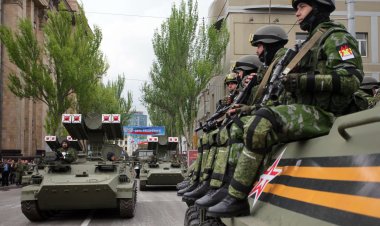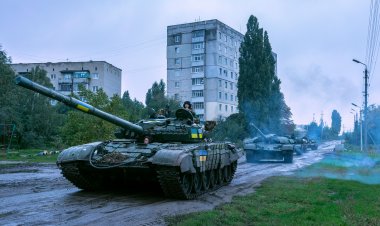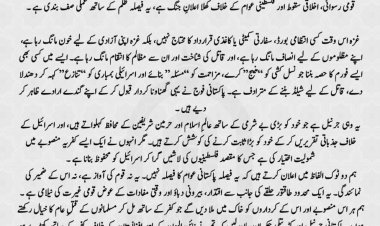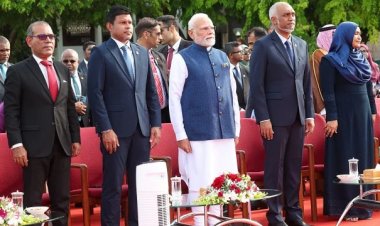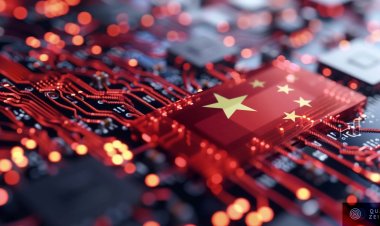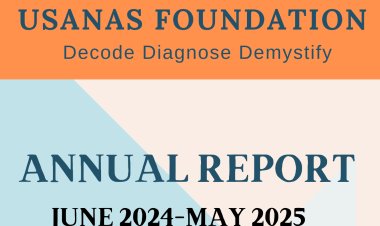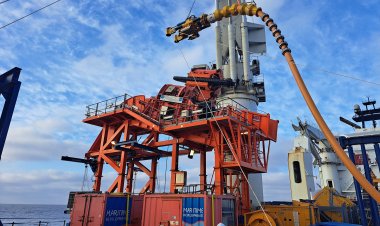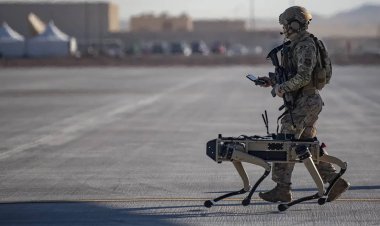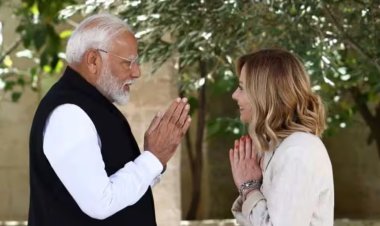The Geopolitical Trajectories of the Russia-Europe Relations: Is Russia still an "Enigma"?
Historical trajectories, geopolitical compulsions, and the location of Russia and Europe in geographical proximity are some of the factors responsible for the present stalemate between the two. The recent Ukrainian crisis is adding further volatility to the relationship between Russia and the EU. The notion of "enigma" is rooted in historical "misperception" between Russia and Europe and can only be resolved through mutual accommodation.
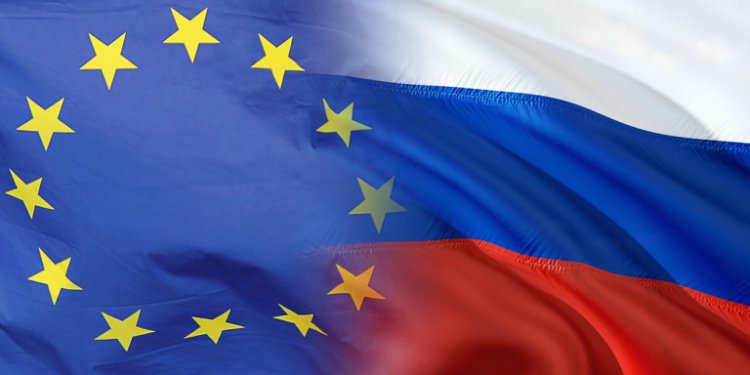
Geostrategic Analysis
By Dr. Nalin Kumar Mohapatra
Abstract
Historical trajectories, geopolitical compulsions, and the location of Russia and Europe in geographical proximity are some of the factors responsible for the present stalemate between the two. The recent Ukrainian crisis is adding further volatility to the relationship between Russia and the EU. The notion of "enigma" is rooted in historical "misperception" between Russia and Europe and can only be resolved through mutual accommodation.
Introduction
The brotherly war between Russia and Ukraine is now more than 100 days, contrary to many quarters' expectations, and it may prolong further. The situation is more fragile in Ukraine as the human catastrophe has reached its height. As per the United Nations report, more than 1 million people have fled from Ukraine to Europe. Similarly, Europe is not only facing an energy crisis because of the disruption of supply following the Russia-Ukraine war but it is also facing a food crisis. It is a known fact that both Russia and Ukraine are the traditional suppliers of food grains to Europe and many other West Asian and African countries.
The European Union has also admitted Ukraine as a candidate for future membership in this regional body. This move will further accentuate the geopolitical divide between Russia-Ukraine and Russia-Europe relations in the foreseeable future.
These developments are heightening the geopolitical insecurity in Europe and the post-Soviet space to a significant extent. However, one moot point that needs to be highlighted here is why Europe, despite having deep-rooted geopolitical and geocultural linkages with Russia, expresses so much "distrust" towards the latter? This is more so as Russia often portrays itself as a "European power".
As discussed above, some of these issues raise a few critical questions in the context of Russia-Europe relations. These are:
- How far are the "misperceptions" between Russia and Europe rooted in historical experiences shaping the state of present relations?
- Is the present war between Russia and Ukraine the product of that "mutual misperception"?
- The potent question that needs to be underlined here is that despite growing trade with Russia, why do the European countries still treat Russia as an "enigma"?
Some of these questions need to be discussed in the above context to understand the root of divergent perceptions between Russia and the European countries. The divergent perception between the two was aptly captured by British Prime Minister Winston Churchill in 1939 in the context of Germany-Soviet relations, where he stated, "I cannot forecast to you the action of Russia. It is a riddle wrapped in a mystery inside an enigma". This statement by Churchill in 1939 is as relevant today as it was for Great Britain at that time. The above statement of Churchill can also be contextualised in the present scenario, as the European countries are adopting somewhat an ambivalent position in the current Russia and Ukraine war. While Germany, France, Hungary and Italy are apprehensive over the sanctions on Russia. On the other hand, Poland, Baltic countries, and a few others like the Nordic countries are demanding punitive measures against Russia. This calls for tracing the historical roots of Russian and European divergence perceptions.
The Historical Context
This ambivalent position of Europe toward Russia is primarily rooted in "historical perception". Despite Russia's inconsistent position regarding its role in European society, it is an accepted fact that successive Tsarist rulers of Russia have had a fascination with European civilisation. This process was started with the regime of Peter the Great and reached its zenith during the period of Catherine II, who underlined that "Russia as a European state". In this regard, it is pertinent to mention that there is a divergence concerning Russia's spiritual position in the European Civilisation, as it claimed that it possesses a unique character of "Third Rome" as popularised by the Russian Saint Filoppe in the middle of the 19th century. The concept initially rose to prominence in the 15th century, when Russia started its obsession with the European identity (Strémooukhoff, Dimitri, (1953)"Moscow the Third Rome: Sources of the Doctrine". Speculum. 28 (1): 84–101). The French Philosopher Voltaire, in the middle of the 18th century, took great interest in the study of the language, literature, and political system of the Russia, and Catherine II was a great admirer of him. The French scholar also greatly appreciated Catherine II's governance practices, like her policy of separation of "spiritual" and" temporal authority". It may be added that since the beginning of the 15th century, Russia has also shared strong economic and cultural relations with the European countries (Voltaire, M, de (1906) The History of the Russian Empire under Peter the Great, Vol. I, London: L Davis & C. Reymers, pp.110-111; Strémooukhoff, Dimitri, (1953) "Moscow the Third Rome", op. cit ).On the strategic front, the Russia-Sweden war, also known as the Finnish War, gave Russia an empathic victory in 1808. Napoleon's unsuccessful attempt at invasion in 1812 allowed Russia to reclaim its place as a "European state" as envisaged by Catherine II. In this regard, it may be underlined that the war with Sweden gave a decisive advantage to Russia as it brought Finland under the Russian sphere of influence. This war also provided Russia, as studies suggest, in controlling both the Black Sea and Baltic Sea. It is a fact that towards the end of the 19th century, there was a growing debate within the Russian academic circles regarding Russia's role in Europe (Neumann, I.(2008) "Russia as a great power, 1815–2007". J Int Relat Dev, Vol. 11, 128–151; Courtney, Anthony( 1954)"The Background of Russian Sea-Power", International Affairs, Vol.30, No.1, pp. 13-23). This is because the Tsarist empire during that time expanded itself to the Caucasus and Central Asia, in what many Slavophile scholars call the "civilizing mission" (Hofmeister, Ulrich(2016) "Civilization and Russification in Tsarist Central Asia, 1860–1917" Journal of World History, Vol. 27, No. 3, pp. 411-442). In his work First Philosophical Letter, Russian Philosopher Pytor Yakovlevich Chaadayev of the 19th century gave a geo-philosophical notion to Russia's identity question. As stated by Chaadayev, "Russia belongs neither to the West nor to the East leaning with one elbow on China and another on Germany" (as quoted in Macaes, Bruno( 2018). The Dawn of Eurasia: On the Trail of the New World Order, London: Allen Lane, p. 180).
In this regard, it is pertinent to mention that even German geopolitical thinker Karl Haushofer also favoured greater cooperation between Russia and Germany. Haushofer urged that Russia was Germany's "natural ally" to checkmate the British force (Weigert, Hans W.(1942) "Haushofer and the Pacific", Foreign Affairs, Vol. 20, No. 4, pp. 732-742).
Some of the above observations highlight that though there was a mutual engagement between Russia and European countries historically, at the same time, one cannot deny the existence of mutual misperception between the both. The same was continued even during the Soviet period. Mikhail Gorbachev also underlined the Soviet Union's European identity by highlighting the concept of a "Common European Home" in 1989 before the Parliamentary Assembly of the Council of Europe.
The Strategic Framework of Russia-Europe Relations
In the post-1991 phase, also Russia tried to engage with European countries through civilizational linkages and took measures to boost relationships with them. The most contentious issue which aggravated the antagonism between Russia and European countries, particularly with the Central and East European countries, is the NATO's expansion and the joining of some of these countries into this fold. Additionally, the bombing of Kosovo by NATO in 1997 also aggravated the mutual apprehensions. The other issue was the growing inclination of Ukraine toward NATO. To a great extent, some of these issues sowed the seeds of distrust between Russia and the European countries. The emerging geopolitical dynamic between Russia and the West due to NATO's Eastward expansion was aptly summarised by Dmitry Trenin in his book ( The End of Eurasia: Russia on the Border Between Geopolitics and Globalization, 2001, Carnegie Moscow). In the book, Trenin writes.
"The cumulative impact of all these different and interrelated processes is the end of the buffer zone, which many members of the Russian elite thought necessary for national security and Russia's great power status, and the emergence of the new West. As a result, Russia is likely to come into direct contact with NATO and/or EU territory along the entire northwest from the Kola peninsula to Kaliningrad" (Ibid, Trenin, The End of Eurasia: P.159).
It has also been observed that since 1991 there have been constant apprehensions from the Ukrainian authorities regarding its position in the post-Soviet space. However, Ukraine was part of the CIS structure after 1991 but was highly apprehensive of Russia's moves. This is more so as Kyiv increasingly toed the West's mandate, including more significant engagement with NATO. As discussed by Trenin above, Russia wants a "buffer". Similarly, the American strategic thinker Zbigniew Brzezinski in his book The grand chessboard: American primacy and it's geostrategic imperative, Basic Books, New York, 1997), outlined the strategic consequences for Europe if Russia took over Ukraine. In this regard, Brzezinski highlights: "if Moscow regains control over Ukraine, with its 52 million people and major resources as well as its access to the Black Sea, Russia automatically again regains the wherewithal to become a powerful imperial state, spanning Europe and Asia" (Brzezinski, The Grand Chess Board, Ibid, p.46).
A closer look at the writings of both Trenin and Brzezinski reflects three fundamental points in Russia and Europe relations. These are:
- Though Europe wants to engage with Russia, they are pretty apprehensive of Russia's geopolitical moves.
- European countries are interested in creating a "strategic buffer" or "cordon sanitaire" in and around the region bordering Ukraine and Poland to protect themselves from Russia's move. In a nutshell, one can add that the security of Ukraine and the Black Sea is vital to Europe's security as the two analysts argue.
- The fallout of this strategic apprehension from European countries was the expansion of NATO towards eastward Europe. This created a new form of "security dilemma" in the Eurasian space.
Some of the theoretical inferences discussed in the context of the writings of both Trenin and Brzezinski reflect that over the years, the misapprehensions between Russia -Ukraine, and Russia -Europe were mainly on the question of the strategic move of Russia and NATO towards each other.
Changing strategic reality and Russia-Europe Relations
In the initial years, the West provided full patronage for NATO's expansion towards the Eastern part of Europe along with the subsequent Colour Revolution in the vicinity of Russia, Ukraine, and Georgia along with Kyrgyzstan, which greatly annoyed Russian President Vladimir Putin. Highlighting the negative impact of the Colour Revolution President Putin stated "For us this is a lesson and a warning. We should do everything necessary so that nothing similar ever happens in Russia". Similarly, joining by Baltic countries under NATO'S security umbrella and the EU has also sent enough signals to Russia regarding its strategic encirclement in the post-Soviet space. Though Russia gave a befitting reply to NATO and the West when it carved out South Ossetia and Abkhazia from Georgia in 2008 and annexed Crimea in 2014.
Some of these strategic developments, to a great extent, impacted Russia-Europe relations. As stated by President Vladimir Putin in his March 2014 speech, "they [the West] have lied to us many times, made decisions behind our backs, placed us before an accomplished fact. This happened with NATO's expansion to the East, as well as the deployment of military infrastructure at our borders".
The speech by Putin indicates Russia's worries about NATO's growing apprehensions about the West's strategy and its policy of encirclement Russia. At the same time, the EU's policy of "democracy promotion", "Responsibility to Protect", and Russia's opposition to some of the concept has also generated thaws in their mutual relations. The same was more glaring evident after the 2014 Crimea crisis.
One may add that Russia and the European Union agreed to ratify the Partnership and Cooperation Agreement (PCA) in 2005. However, Moscow rejected the European Neighbourhood Policy (ENP), understanding its security implications. Studies suggest that in the post-2014 Crimea Crisis, NATO beefed up its military presence in and around to checkmate the potential threat from Russia. Primarily to checkmate threats from NATO, Russia conducted regular military exercises to demonstrate its combat capability. The Zapad military exercises Russia conducts with its allies to demonstrate that it is capable of meeting any security challenges.
However, Europe's growing dependence on Russia's energy propelled a new kind of relationship between these two historical neighbours.
Energy and Russia-Europe Engagement
Though Russia and the EU have an apprehension towards each other in the security realms, the picture is quite promising if one looks at their bilateral economic relations. This puts Europe in the form of "complex interdependence" as outlined by Robert Keohane and Joseph Nye. (Keohane, Robert O., Joseph S. Nye, Jr, ( 1987) "Power and Interdependence Revisited", International Organization, Vol. 41, No. 4 , pp. 725-753) In this regard, it is pertinent to mention that Russia is one of the significator energy exporters to the European market. As per the Eurostat trade statistics 2022, Russia's export to Europe was "4.1 percent and import was 7.5 percent". As per the above trade statistics, this trade figure put Russia as the fifth largest exporter to Europe and the seventh-largest importer from Europe. The Eurostat trade statistics also outline that Energy was the dominant primary good as far as Russia's export to Europe is concerned. As a result, one cannot deny that energy is one of the most critical syncretic factors that binds the relationship between the two despite the bitter strategic rivalry.
The significance of energy in the context of Russia-EU relations is evident from the recent energy crisis which the EU is currently facing. This happened due to the stoppage of Russian energy to Europe through the North Stream 1 pipeline due to technical snags that Russian energy giant Gazprom underlined. As stated by Gazprom Chief Alexi Miller, while giving a geopolitical tone and tenor to the stoppage by stating, "Our product, our rules. We don't play by rules we didn't create". The worst hit due to the supply cut by Russia to Europe was Germany. As the German Economy Minister Robert Habeck stated, it was "politically motivated". Germany, Poland, Holland, Bulgaria, and Finland are the worst hit due to Russia's energy supply disruption. One may recall here that a few weeks back, Ukraine asked Germany to stop oil imports from Russia through the Nord Stream 1 route before the present stalemate in terms of energy supply occurred. As stated by the Head of Ukraine energy company Serhiy Makogon "With Naftogaz we sent an appeal to the German economy ministry and the German regulator... on the suspension of Nord Stream 1".
Thus, one can infer from the above discussion that the securitization of energy supply is one of the moot points of conflict between Russia -Europe.
Europe and Russia-Ukraine War
The present Russia-Ukraine War can also be seen in the context of NATO's larger design to expand itself in the post-Soviet space and Russia's determination to prevent that as discussed above. These two factors are primarily shaping the War between these two brotherly countries. Of late, four European countries which are part of NATO have taken measures to checkmate Russia's aggressive postures. Of these four countries, Germany, Italy, and France earlier took a contrary position regarding actions against Russia, especially on the imposition of sanctions. The recent visit of France President Emmanuel Macron, Germany Chancellor Olaf Scholz, Italy's Prime Minister Mario Draghi, and Romania's President Klaus Werner Iohannis to Kyiv before the EU meeting was to decide Ukraine's membership in the EU. Although the visit by these European leaders to Ukraine was considered sympathetic to Russia, it was a new strategic move by the EU in particular and the West, in general, to further isolate Russia. Though these four leaders agreed to provide arms and ammunition to Ukraine for its War against Russia, German Chancellor Scholz underlined that "Ukraine belongs to the European family".
On the other hand, Russia took a cautious stand as outlined by Dmitry Peskov, the spokesperson of the Presidential Administration of Russia, "it’s very important for us that all these processes don’t bring more problems to us and more problems in the mentioned countries' relations with us”. This is a clear and strong message from Russia responding to the situation. However, the question needs to be emphasized whether the European countries will accept Ukraine in its geo-cultural fraternity?
A closer look at Europe's policy towards Russia demonstrates that it is based on engagement and distrust towards each other. The geoeconomics compulsions are putting both in a mutually beneficial relationship. On the other hand, this is an accepted fact that there is a geocultural and geopolitical rivalry between Russia and Europe. This is propelling the relevance of the term “enigma” as highlighted by Churchill.
One point that needs to be underlined here is how the proxy war which is going on between Russia and Europe is going to have an impact on India. This is important because, like the European countries, India also shares a strong bilateral relationship with Russia. At the same time, there is a great deal of engagement between India and Europe in the context of renewable energy and trade. Some of these developments need to be analysed in detail.
India's Policy Options
The intricate relationship between Russia and the EU contributes to a new kind of strategic realignment in both the European and the post-Soviet Eurasian space. This contributes to strategic chaos and an opportunity for outside players in both regions. The ongoing war between Russia and Ukraine further complicates the historically strained Russia-Europe ties due to misperception. In this context, India is pursuing a “balanced engagement” with Russia and Europe.
While looking at India and Europe relations, there are three crucial issues that provide a broad convergence. These are a) a strong convergence on “democratic values”; b) robust trade and economic relations; c) scientific and technological cooperation including in the field of “renewable energy and climate change”.
It may be recalled here that trade between India and the EU is growing at a faster rate. If one looks at the trade figures in terms of export and import for instance, in 2021 as per the Eurostat report, India's export to the EU "was about €46 billion and EU's export to India was about €42 billion".
Over the years, India has also strengthened ties with the Nordic countries. The conclusion of the Second India-Nordic countries in May 2022 at Copenhagen is a testimony to this. The Joint Statement issued at the Summit: "affirmed their support for a rules-based international order and for multilateral institutions and their commitment to work towards making them more inclusive, transparent, and accountable with the aim of addressing global challenges more effectively".
Similarly, Prime Minister Narendra Modi's visit to France and Germany has strengthened India’s relations with both these countries to a great extent. During his visit, Prime Minister Modi discussed different areas of cooperation with these two countries ranging from trade to climate change and collaboration in renewable energy.
At the same time, India-Russia relations have been on a higher pedestal over the years. It is a fact that India shares a deep-rooted civilizational and strategic partnership with Russia. Over the years, India has strengthened relations with Russia in defence and energy cooperation. Similarly, India is investing significantly in the energy fields of Russia's Siberia and the Far East. In this regard, it is pertinent to mention that India and Russia have strengthened their bilateral relations in bilateral trade. During the 21st India-Russia Annual Summit, Prime Minister Modi stated, "We have set a target of $30 billion in trade and $50 billion in investment by 2025”.
So also, India consistently urged Russia to resolve the dispute with Ukraine through “peaceful means and dialogue”. India is also emerging as a critical partner of Russia in terms of energy trade. While Russia was not on the list of major crude oil suppliers to India in the past, in recent months, there was a significant boost in the energy trade between the two countries. This is more so after the onset of the Russia-Ukraine War. As per recent statistics, the import of oil from Russia into India in the month of “February 2022 was 100,000 br/d and the same rose to 870,000 br/d in the month of May 2022”.
The primary reason to discuss India’s relations with Europe and Russia is to underline that its relationship with both is on an equal footing. While the European countries appreciate India’s global role, Russia is also keen to strengthen the traditional bilateral relationship with India. One key aspect is that despite having a strategic partnership with Russia, India never supported Russia in its war against Ukraine. Instead, India advocated a “peaceful resolution of disputes” between Russia and Ukraine. Both India and European countries are also jointly can play a significant role in providing humanitarian aid to the war-ravaged Ukraine. This can mitigate humanitarian catastrophe in Ukraine to a substantial extent.
One moot point which brings both India and the European countries is how to contain an expansionist China. This is gaining more importance in recent years as China is pursuing a geo-economic invasion of the EU market through its One Belt One Road (OBOR) project, and putting the European countries in a more vulnerable position. China is also posing a threat to India over the years. Similarly, it is well-known that Russia is also sensing the danger from China, particularly in its Siberia and the Far East region. However, Russia will not air its resentment towards China as there is a growing dependency on the part of Moscow on Beijing for exporting its primary products and earning foreign exchange which will sustain its economy. However, Russia’s overdependency on China is not good for its economic development in the longer run. Thus, there is a need to carve out a common front by India, Russia, and European countries against an expansionist China.
Conclusion
While looking at the question of Russia- Europe relations in a geocultural and geostrategic perspective, three important points need to be drawn relevant to the present context. These are:
- the historical context which generates a sense of apprehension for both and the same is continuing even now.
- The geopolitical engagement and rivalry between Russia and Europe are rooted in mistrust, contributing to the strategic stalemate.
- Though there is a sense of mutual interdependency between Russia and Europe in trade relations, but geopolitical complexities overshadow it.
The above three mentioned trajectories significantly impede the fruition of successful cooperation between Russia and the European countries. In this regard, Ukraine is a major “flashpoint: and source of conflict". The recent addition of Ukraine to the European Union as a Candidate for EU membership will propel a new geopolitical alignment in the post-Soviet Eurasian space. This, in a way, will bring NATO and the EU to the doorstep of Russia. In a way, this will contribute to the further escalation of war between Russia and Ukraine.
One needs to highlight here that Russia is still an “ enigma” for Europe because of its strategic location in the vicinity of Europe’s border and the geopolitical mistrust and contradictions both of them have inherited for centuries. The same is also reflected in the recent Russia and Ukraine crises.
In this regard, because of its growing stature in international relations, India should mediate in the dispute between Russia and Ukraine and Russia and European countries. This, to a great extent, can ensure peace and security in Europe and the Slavic part of post-Soviet Eurasia.
Disclaimer: This paper is author’s individual scholastic contribution and does not necessarily reflect the organization’s viewpoint.


